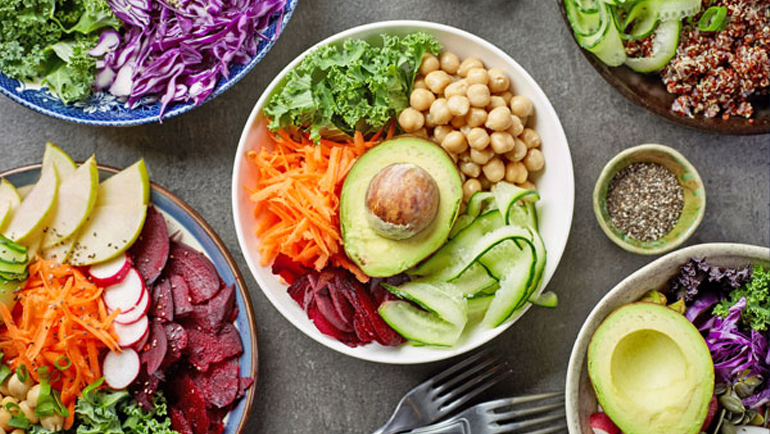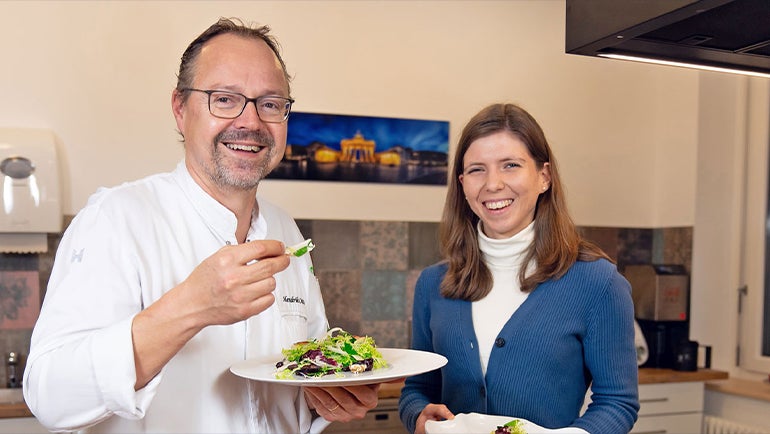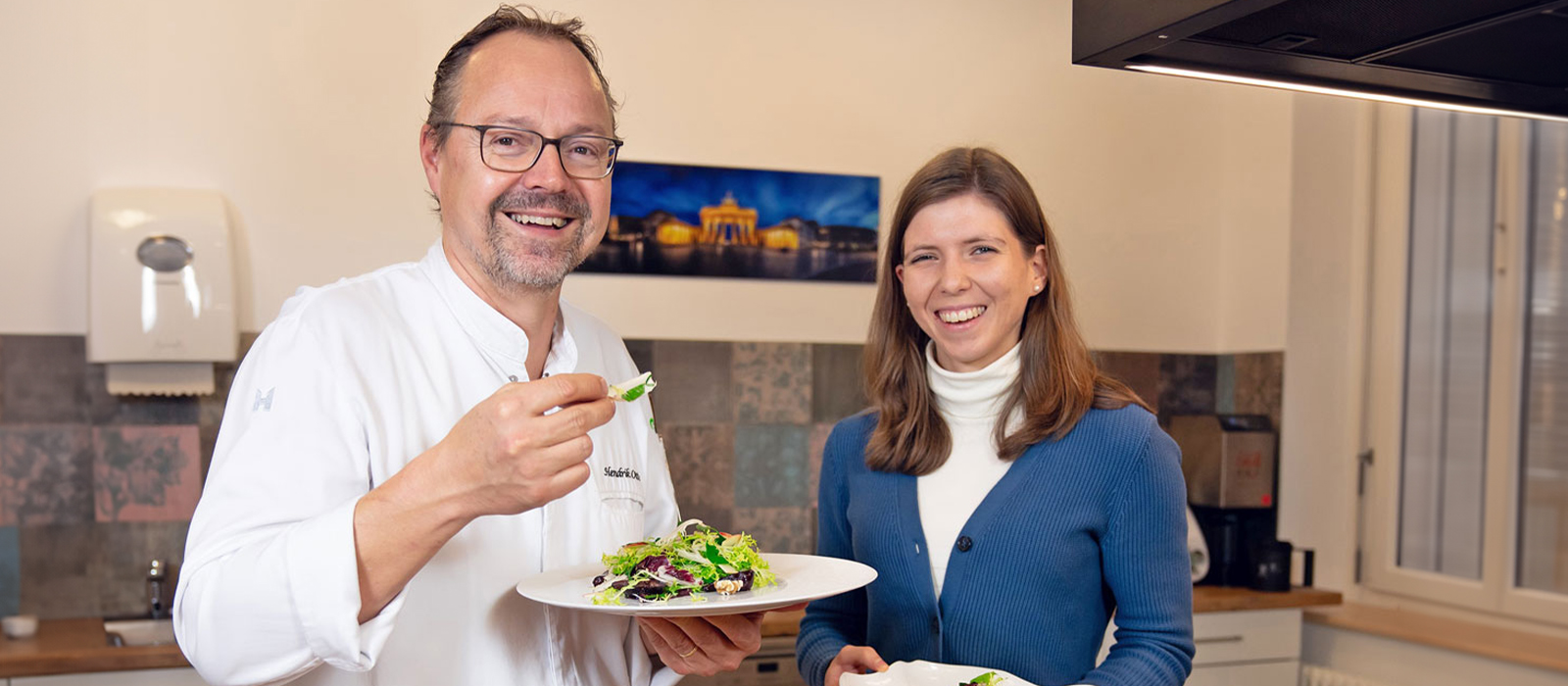
Many of us make New Year’s resolutions. And many of these resolutions focus on health, more fitness, and a more balanced diet. How about giving a vegan or low-meat diet a try? In an interview with Fresenius editor Brigitte Baas, two-Michelin-star chef Hendrik Otto from Helios and ecotrophologist Verena Kaiser explain the health benefits a vegan or low-meat diet can bring for each and every one of us. And why such a diet is also important and good for the environment. This also applies to the Helios hospitals, where this special form of nutrition has been increasingly used for some time.
(Published: January 2024)
Hendrik Otto has been responsible for sustainable cuisine and quality at Helios since 2022. Together with Verena Kaiser and the Helios catering team, he improves the food in the Helios hospitals on a sustainable basis and makes sure that the six million lunches served each year also taste good to patients.
Every now and then it's good to rethink your eating habits and change them, if necessary, especially in the New Year. One option is to eat a vegan diet. Where do you see the health aspects of such a diet?
Hendrik Otto: This diet is rich in vegetables, legumes, nuts, and fruits, and thus often also high in fiber, protein, antioxidants, and many other important nutrients. All of this is beneficial in terms of fitness, resilience, and health.
What does this mean in concrete terms?
Verena Kaiser: Studies show that a healthy and balanced plant-based diet can reduce the risk of heart disease, certain cancers, and type 2 diabetes. It can also help to control weight and improve general health. And it is usually quick and easy to prepare, not to mention very tasty.
That does sound promising. To what extent can a vegan diet also contribute to sustainability?
Hendrik Otto: Eating a vegan diet definitely has a positive impact on the environment. Animal products often require large quantities of water, land, and feed during the production process. By eschewing animal products and eating more regional and seasonal foods, we can reduce our environmental footprint, cut greenhouse gas emissions, conserve natural resources, and save energy or transport costs.
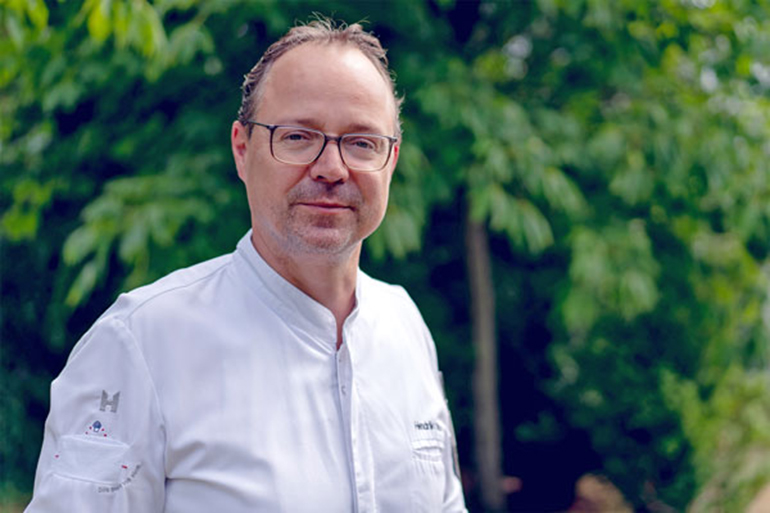
But how does this all work in practice in the hospital? Is vegan cuisine even possible in a commercial kitchen?
Hendrik Otto: Without a doubt! At Helios, we endeavor to meet the diverse needs of our patients. This also includes catering for special dietary needs, such as vegan food, low-meat and completely meat-free options, and regional products. Last fall, we added more than 20 new dishes to the Helios lunch menus. Whether chickpea curry with rice, falafel balls with pea puree, or a bratwurst made from 75 percent vegetable protein and just 25 percent organic pork – there is considerable variety, and we also offer them in our hospitals.
Verena Kaiser: The nutritional perspective is very important to us here. It enables us to ensure that the nutrition we are providing is balanced and delivers the necessary nutrients that are essential for the recovery and well-being of our patients. In our standard selection there are six vegetarian and four vegan dishes.
Incidentally, a wider range of low-meat dishes is served not only at the patient’s bedside, but also in our cafeterias. There is already a daily vegan option for patients, visitors, and also our employees at many Helios locations. So, it is worth leaving old habits behind more often in the new year and trying a delicious vegan dish instead.
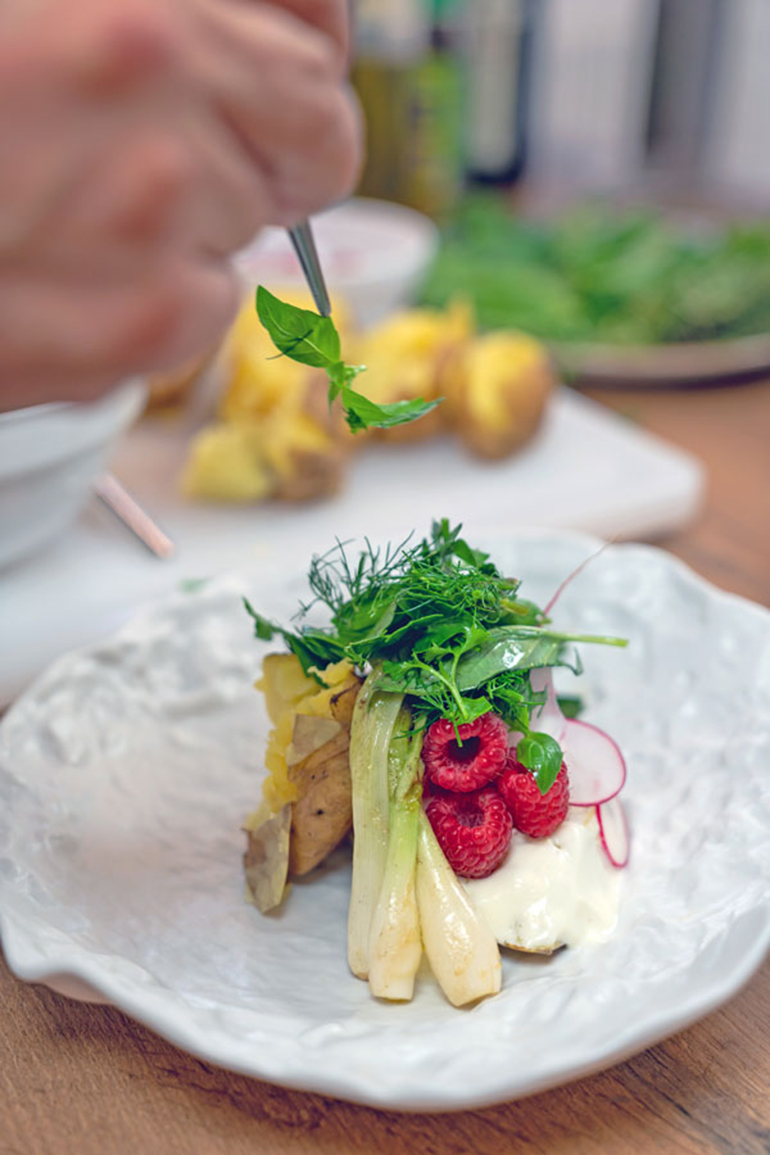
ⓘ What exactly is Veganuary and what does the vegan diet typically involve?
The so-called Veganuary annual challenge – a campaign that revolves around the vegan diet – traditionally takes place every January. The idea behind Veganuary is to encourage consumers to try a purely plant-based diet for a month and embrace the benefits of this diet – in order to lead a more conscious life in general. January is traditionally the month when people all over the world make New Year’s resolutions, it is therefore a good time to rethink old habits and try something new. According to experts, a vegan diet is one of the best ways to protect the environment, prevent animal suffering, stop climate change, and improve the health of millions of people. “Veganuary” is a portmanteau word coined from the words “vegan” and “January.”
A vegan diet – what exactly does that mean?
During Veganuary, all foods of animal origin – such as meat, fish, poultry, dairy products, eggs, and even honey – should be avoided. Instead, vegetables, legumes, nuts, and fruit should be on the menu. Some consumers also avoid other animal products, such as leather, and oppose other forms of animal exploitation, such as animal testing. Veganism is a form of nutrition and way of life with its roots in vegetarianism.
Those who manage to put together a diverse and balanced vegan diet should exhibit no deficiency symptoms. Only vitamin B12 should be integrated into the diet via dietary supplements, since this vitamin is mainly found in animal products. Plant-based foods usually do not contain vitamin B12 unless they have been artificially fortified.
History of the month
The Veganuary campaign was launched in 2014 by the organization of the same name in the UK and has since spread all over the world. The organization’s aim is to raise awareness of the one-month pledge and promote veganism. In Germany, Veganuary was first advertised back in 2019.
Kontakt
Helios Kliniken GmbH
Friedrichstr. 136
10117 Berlin
Deutschland
T +49 30 521 321-0
Related Links
More information - Veganuary

